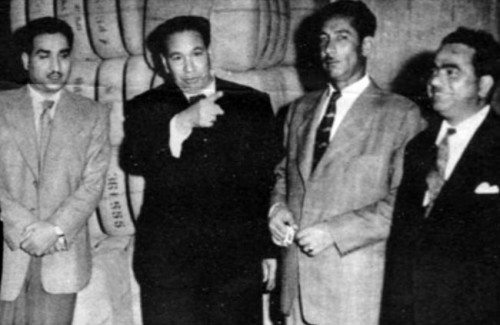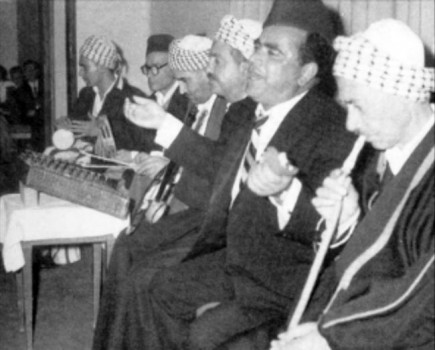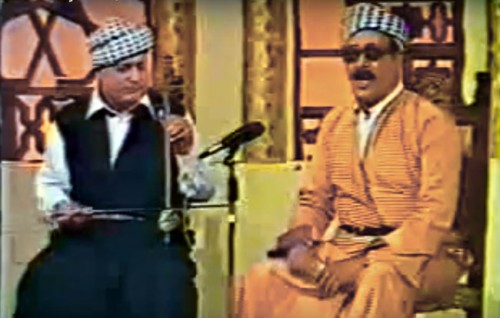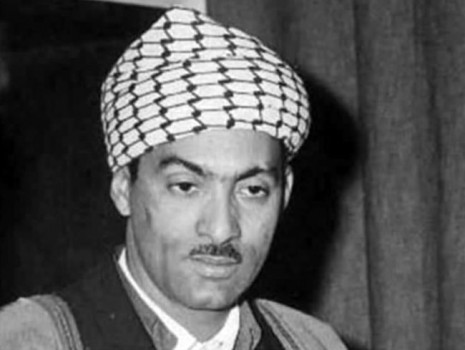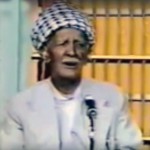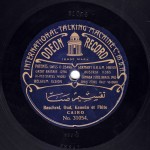The Arab Music Archiving and Research foundation (AMAR), in collaboration with the Sharjah Art Foundation (SAF), presents “Min al-Tārīkh”.
Dear listeners,
Welcome to a new episode of “Min al-Tārīkh”.
Today we will resume our discussion about al-ṭarīqa al-Qubbāngiyya with Mr Husayn al-A‘zami.
What about the disciples of Muḥammad al-Qubbāngī?
He had many disciples out of whom I selected a few:
The major singers who followed the Qubbāngī school of Iraqi maqām include most importantly late ‘Abd al-Raḥmān Khuḍr who was born in 1925 in the famous Faḍl neighbourhood in Baghdad and died there of an incurable disease in 1984. As a young boy, he had studied in katātīb, i.e. Mullāh.
…Religious studies.
Yes. They are called katātīb in Baghdad. He did not obtain a primary school diploma… In fact, he may have even not gone further than primary school altogether.
As a young man, he listened to manqaba nabawiyya sharīfa (the Noble Virtues of the Prophet), added to dhikr (Muslim parareligious ceremony where the assembly repeats indefinitely a memory spell of divine invocation, while the officiant cantillates the verses of a qaṣīda) and tahlīl (praise), and started learning Iraqi maqām. Moreover, the influence of Muḥammad al-Qubbāngī almost dominated completely his personality and performance specificity.
‘Abd al-Raḥmān Khuḍr kicked off his artistic journey in 1948 upon entering the Iraqi Radio for the first time and recording his first maqām, the maqām ūrfat, with the song “Rabbētak zghayrūn Ḥasan”. Unfortunately, this muṭrib (singer) miss-exploited his extremely beautiful vocal tessiture by not being technical enough and failing to apply correctly the historical maqām principles, performing incomplete maqām-s, ignoring critique, and insisting on singing only what he felt like singing, the way he felt like singing it.
He sang at whim.
Exactly.
In my book, while writing about the recordings of ‘Abd al-Raḥmān Khuḍr, I mentioned that he made several Radio and TV recordings of Iraqi maqām-s that display his passive performance depicting zero effort on his part to create something new: he only sang what he had inherited from his master Muḥammad al-Qubbāngī without attempting any personal interpretation.
And he died before him.
Despite this ready-to-perform inherited repertoire, the maqām-s he sang were always incomplete: having this repertoire available and still performing an incomplete maqām form is very strange indeed.
This is illustrated in his performance of the maqām ḥijāz dīwān in ‘Umar Bin al-Fāriḍ’s qaṣīda:
A-barqun badā min jānib al-ghawri lāmi‘u
Am irtafa‘at ‘an wajhi layla al-bāriqu
Asfarat laylan fa-ṣāra bi-wajhihā nahāran
Bihi nūr al-maḥāsini saṭi‘u.
… A marvellous Sufi qaṣīda.
‘Abd al-Raḥmān Khuḍr’s errors while recording, his ignorance of critique, his lack of interest in performing Iraqi maqām correctly, all contributed to conveying an imprecise idea of what he wanted:
On the one hand, he sang minor and major maqām-s, including the most difficult ones, thus affirming his ambition as well as the ability of his vocal range… He was courageous indeed;
Yet, on the other hand, he did not abide by the form, nor showed any interest in respecting it. He also never took into account maqām music critics nor listened to them, continuing to perform the maqām-s at whim and as he knew them.
‘Abd al-Raḥmān Khuḍr aimed at rendering a performance built upon what he had decided, and hoped expert critics would not criticize him, whether constructively or not. He sang several maqām-s and benefitted the maqām heritage as much as he could. Still his ignorance of critique did not serve him well.
(♩)
Now, let us talk about Ḥamza al-Sa‘dāwī who is the complete opposite of ‘Abd al-Raḥmān Khuḍr: His vocal tessiture was not as beautiful as the latter’s and, moreover, he respected the maqām structure and could have easily been a teacher.
…The maqām structure according to al-ṭarīqa al-Qubbāngiyya and not according to al-ṭarīqa al-Qundargiyya…
The maqām structure, i.e. the maqām form.
Like Al-Qundargī.
Exactly.
The historical qiṭa‘ and awṣāl (the instrumental parts or qiṭ‘a-s and the vocal waṣla-s) inherited throughout the generations.
Was he truly a teacher? You said that he could have easily been one.
Muṭrib Ḥamza al-Sa‘dāwī (1928 – 1995) was born in Karbala, a province in Middle Iraq, where he completed his primary studies. The young boy already tended towards singing and music, especially Iraqi maqām. Later, the young man moved to the capital Baghdad where he often had the opportunity to watch and meet experts and singers. But during this period at the beginning of his artistic journey, he was greatly influenced by major muṭrib Yūsuf ‘Umar, performing an almost parrot-like imitation of the latter’s voice, lyrics, and melody. His performance aesthetics were dominated by this influence to such an extent that he became a quasi-exact copy of Yūsuf ‘Umar.
In the 1970s, he rented the café “Al-matḥaf al-baghdādī” (The Baghdadi Museum) where he hosted weekly concerts every Friday afternoon. This is the maqām café where I started off my artistic career on Friday the 23rd of March 1973 singing the maqām mukhālaf, encouraged by muṭrib Ḥamza al-Sa‘dāwī… I am a graduate of this café.
Beautiful!
I owe him my career…
We did not talk to each other for ten years, yet I always make it a point to mention that I went on stage for the first time thanks to him.
But critics and some envious people turned him against me and made him say negative things about me, knowing that he was the one who had encouraged and introduced me, and was so proud of me… So I left him yet never uttered a single negative word about him. We did see each other before he passed away, on which occasion he asked me: “Why are you like this?” and I answered: “Why did you say bad things about me? How did these people convince you to do this? I only ever say good things about you”… He ended up apologising to me. When he passed away, during one of the cultural majlis (assembly) sessions I held every Thursday morning and that went on for ten years, I eulogised him in my own home –even though we had not been on good terms– with munshid-s (chanters) who performed a manqaba nabawiyya.
Ḥamza al-Sa‘dāwī was a traditionalist who failed to exploit his wealth of information on maqām and to create a personal style out of the performing styles taught to him. He continued to imitate Yūsuf ‘Umar and never came up with a personal ṭarīqa even though he had the ability to do so and knew a lot about the particularities and details of Iraqi maqām. He clearly gave in aesthetically to Yūsuf ‘Umar’s performance of maqām. Despite this, al-Sa‘dāwī was more aware than his contemporary muṭrib ‘Abd al-Raḥmān Khuḍr of the tradition of his master Muḥammad al-Qubbāngī, respecting the maqām form and the traditional principles of melodic patterns, understanding and realising the importance and value of these principles in the performance of maqām. He was also capable of telling about Iraqi maqām and its principles in a way that affirmed his knowledge of the details, thus confirming his ability to teach. Yet, despite his rich and varied vocal range –tenor–, his voice was not beautiful and sounds distant and choked in his recorded maqām-s.
(♩)
Dear listeners, we have reached the end of today’s episode of “Min al-Tārīkh”.
We will meet again in a new episode to resume our discussion on al-ṭarīqa al-Qubbāngiyya.
We thank Mr. Husayn al-A‘zami as well as all those who lent us recordings and whose names were mentioned in previous episodes.
We will meet again in a new episode of “Min al-Tārīkh”.
“Min al-Tārīkh” is brought to you by Mustafa Said.
- 221 – Zakariyya Ahmed – 12 (1/9/2022)
- 220 – Zakariyya Ahmed – 11 (1/9/2022)
- 219 – Zakariyya Ahmed – 10 (11/25/2021)
- 218 – Zakariyya Ahmed – 9 (10/26/2021)
- 217 – Zakariyya Ahmed – 8 (9/24/2021)
- 216 – Zakariyya Ahmed – 7 (9/4/2021)
- 215 – Zakariyya Ahmed – 6 (8/28/2021)
- 214 – Zakariyya Ahmed – 5 (8/6/2021)
- 213 – Zakariyya Ahmed – 4 (6/26/2021)
- 212 – Zakariyya Ahmed – 3 (5/27/2021)
- 211 – Zakariyya Ahmed – 2 (5/1/2021)
- 210 – Zakariyya Ahmed – 1 (4/28/2021)
- 209 – W-al-Lāhi lā astaṭī‘u ṣaddak 2 (4/6/2017)
- 208 – W-al-Lāhi lā astaṭī‘u ṣaddak 1 (3/30/2017)
- 207 – Bashraf qarah baṭāq 7 (3/23/2017)

